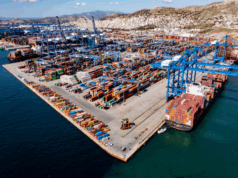As the EU takes critical steps to deliver on its 2030 ambitions, cruise industry leaders and policymakers met today in Genoa to discuss implementation of the industry’s climate goals, latest innovations and investments, and the need for government investment.
Cruise industry leaders convening in Genoa at the industry’s first European Summit devoted to the decarbonisation of cruise have called on governments to join in the effort by creating the right regulatory framework and investments to match the industry’s commitment to accelerate the development and delivery of sustainable maritime fuels and technologies necessary to achieve net-zero carbon cruising by 2050.
The tone was set during the opening session at the Cruise Lines International Association (CLIA) European Summit held today in Genoa, as senior leaders discussed the industry drive to innovate. Cruise lines are investing significantly in research projects and new innovative technologies aimed at improving their environmental performance. New vessels are however only one part of the equation, and the industry will need access to adequate infrastructure and supply of sustainable fuels to achieve their objectives.
 During opening remarks at the Summit, Pierfrancesco Vago, Executive Chairman, MSC Cruises and Global Chair, CLIA said: “The cruise industry shares a vision with European governments of a sustainable blue economy. The industry is stepping up and can deliver on our promises. Clear support from decision makers is needed to ensure that the right infrastructure is developed and is accessible, and that the right incentives can guarantee the development and delivery of sustainable maritime solutions.”
During opening remarks at the Summit, Pierfrancesco Vago, Executive Chairman, MSC Cruises and Global Chair, CLIA said: “The cruise industry shares a vision with European governments of a sustainable blue economy. The industry is stepping up and can deliver on our promises. Clear support from decision makers is needed to ensure that the right infrastructure is developed and is accessible, and that the right incentives can guarantee the development and delivery of sustainable maritime solutions.”
Among various government leaders, the Summit was attended by Greek Tourism Minister Vassilis Kikilias, who stated: “Since last autumn we have joined forces and work closely together in order to support cruising in the area and the results so far are very positive. We now have a longer tourism period and we create new jobs and more income for both the national and local economies in Greece. We aim to continue our fruitful collaboration with CLIA and local authorities in order to further develop a sustainable tourism product”.
Marie-Caroline Laurent, CLIA’s Director General in Europe, added: “The cruise industry has already taken firm and robust measures towards achieving its decarbonisation goals and, collectively, is committed to deliver. The cruise industry is powering European maritime industry innovation and is critical to help the EU to deliver the necessary step change towards decarbonisation. It is essential that we now need a clear legislative framework to encourage the investment and innovation that will be required for industry to achieve the 2030 EU Fit for 55 objectives and ultimately our 2050 ambitions.”
A panel of cruise lines, shipyards, manufacturers, port operators and fuel producers met to discuss potential alternative fuels and technologies on the horizon to deliver zero-emission cruising. The capacity to produce renewable marine fuels at scale remains very limited, with more focus on other transport modes. The industry is calling for adequate incentives and support mechanisms from governments to secure the supply of future sustainable fuels the maritime sector.
Mr. Vago said during the conference that port infrastructure had been identified by CLIA as another very important area where public finance investment is essential. Cruise lines have committed to use shoreside electricity (SSE), where offered by ports, and 66% of the global fleet will be equipped to connect to SSE by 2027. Only a handful of cruise berths provide SSE in European ports, while the European Union goal is for all main ports in the continent to be equipped by 2030.
Ms. Laurent concluded that the industry efforts are key to its future in Europe, as the sector has a vision to become the most sustainable form of tourism, reducing emissions at sea and in ports, fully implementing the concept of circularity for waste.












